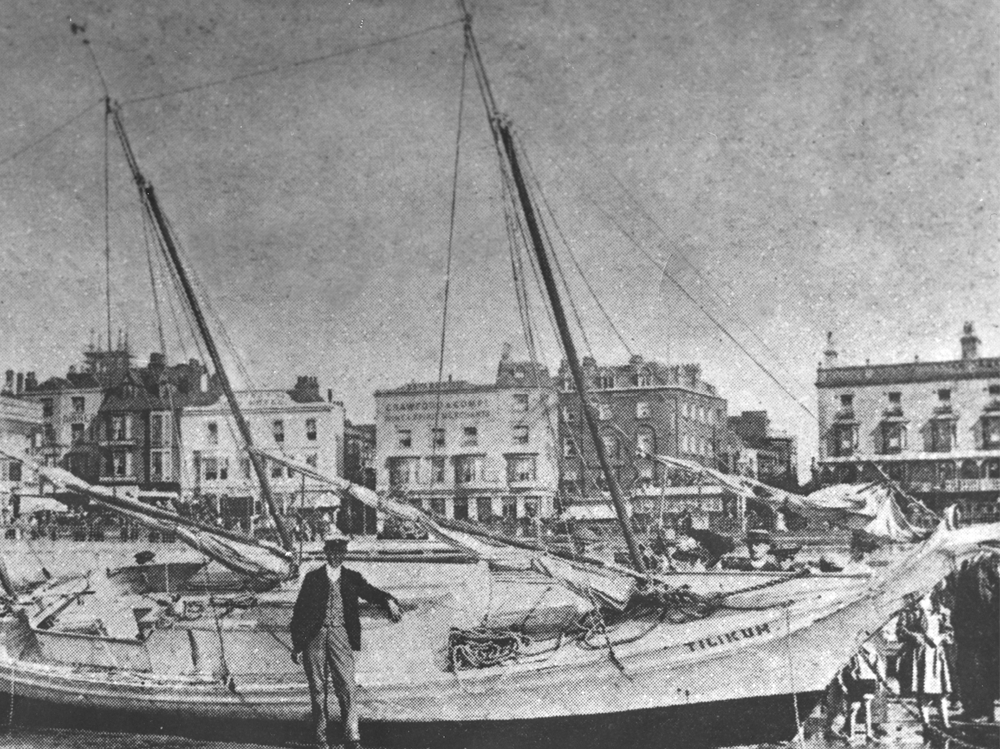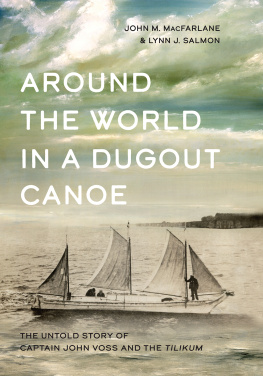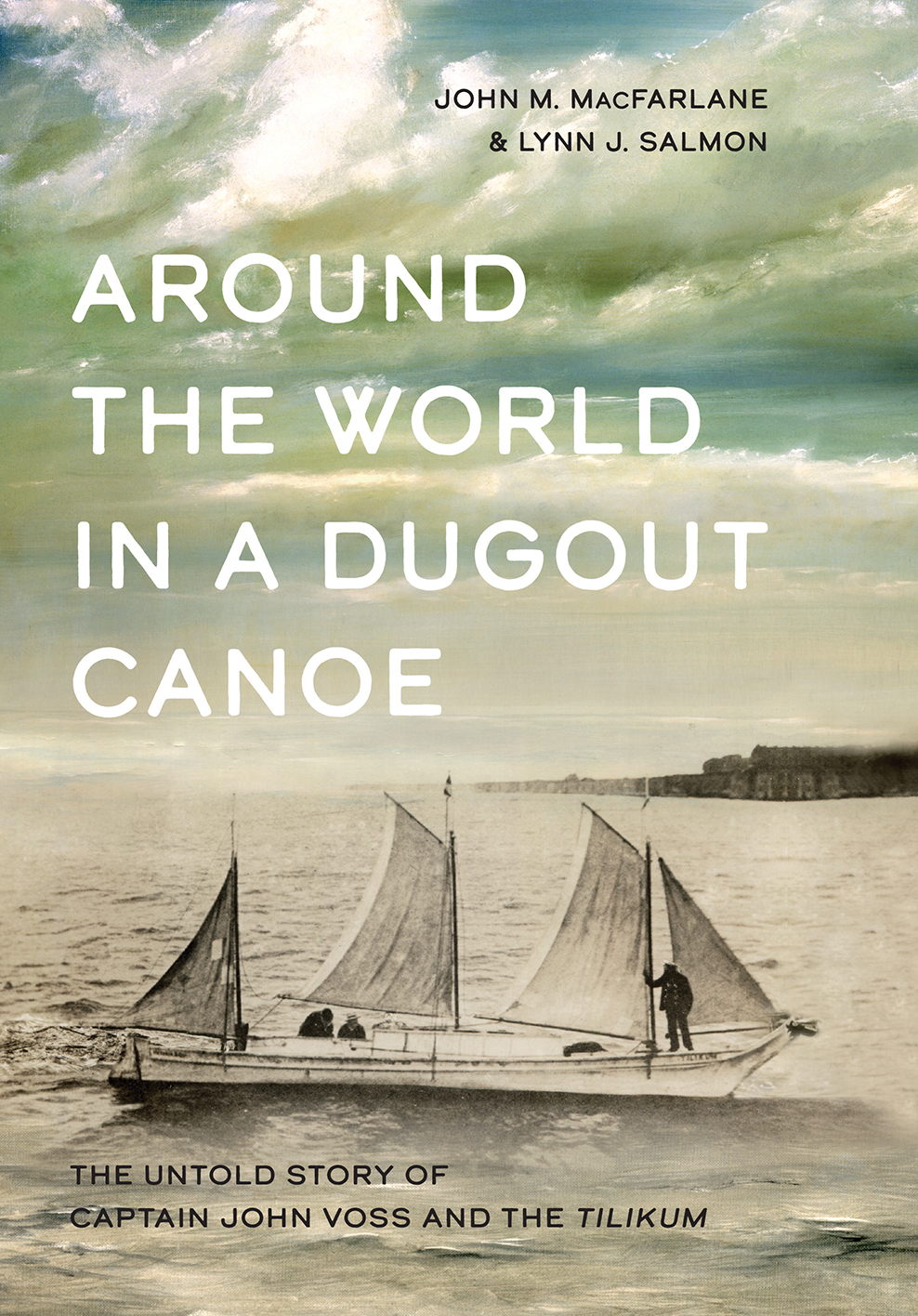Around the World in a Dugout Canoe

The Tilikum at Margate, England, at the end of her voyage.
John MacFarlane collection.
Around the World in a Dugout Canoe
The Untold Story of Captain John Voss and the Tilikum
John M. MacFarlane and Lynn J. Salmon

Copyright 2019 John M. MacFarlane and Lynn J. Salmon
All rights reserved. No part of this publication may be reproduced, stored in a retrieval system or transmitted, in any form or by any means, without prior permission of the publisher or, in the case of photocopying or other reprographic copying, a licence from Access Copyright, .
Harbour Publishing Co. Ltd.
P.O. Box 219, Madeira Park, BC, V0N 2H0
www.harbourpublishing.com
Edited by Arlene Prunkl
Indexed by Rebecca Pruitt MacKenney
Dust jacket design by Anna Comfort OKeeffe
Text design by Roger Handling
Printed and bound in Canada
Jacket credits: front bottomMaritime Museum of British Columbia; backArchives of the Canadian Rockies item lux_i_b1_13_17



Harbour Publishing acknowledges the support of the Canada Council for the Arts, which last year invested $153 million to bring the arts to Canadians throughout the country.
Nous remercions le Conseil des arts du Canada de son soutien. Lan dernier, le Conseil a investi 153 millions de dollars pour mettre de lart dans la vie des Canadiennes et des Canadiens de tout le pays.
We also gratefully acknowledge financial support from the Government of Canada and from the Province of British Columbia through the BC Arts Council and the Book Publishing Tax Credit.
Library and Archives Canada Cataloguing in Publication
Title: Around the world in a dugout canoe : the untold story of Captain John Voss and the Tilikum / John M. MacFarlane and Lynn J. Salmon.
Names: MacFarlane, John M., author. | Salmon, Lynn J., 1965- author.
Description: Includes bibliographical references and index.
Identifiers: Canadiana (print) 20190146745 | Canadiana (ebook) 20190146796 | ISBN 9781550178791 (hardcover) | ISBN 9781550178807 (HTML)
Subjects: LCSH: Voss, John Claus, 1858-1922Travel. | LCSH: Tilikum (Canoe) | LCSH: Voyages and travels. | LCSH: Canoes and canoeing. | LCSH: Adventure and adventurers.
Classification: LCC G420.V67 M33 2019 | DDC 910.4/5dc23
Table of Contents
Preface
I received an invitation to write an article on Captain John Voss from a Paris publishing house for a book they were preparing on the one hundred greatest seamen in world history. I was surprised to see Captain John Voss listed with the likes of Vasco da Gama, Captain James Cook and other familiar names. The publishers suggested that Voss was one of the greatest small craft sailors of all time. The four pages allocated to my section barely touched the topic, though. Trying to tell the story more fully initiated this book project. In reflection I thought I knew the story very well: departing in 1901 from Victoria, British Columbia, the ethnic German, Danish-born Canadian mariner Captain John C. Voss and his newspaperman friend Norman Kenny Luxton began their voyage across the Pacific in a converted First Nations cedar canoe called the Tilikum.
Their story is amazing and every bit as remarkable today as it was in 1901. It is a timeless story of conquering fear and doubt and facing enormous challenges with pluck, ingenuity and roll-up-your-sleeves determination.
But as I began to delve into the story, it quickly became apparent that it wasnt going to be possible to give a proper account of the voyage in just a few pages. To my great surprise, I found the actual story to be far different from the published accounts written by both Captain Voss and Norman Luxton. They not only contradict each other on many important points but both contain inaccurate information.
Much misinformation about Captain Voss and the voyage persists to this day, and is repeated and further distorted by writers on the Internet. With this in mind, I decided I was not willing to accept the facts passed from writer to writer without applying a more critical review to these sources. I embarked on a worldwide search for original archival material and accounts of the Tilikums voyage from contemporary press reports of the day and uncovered a wealth of new and fascinating information.
I have found Voss to be a complex personality. In his element as a sea captain, he handled drunken crew members and waterfront bullies with unreserved authority. When ashore, he charmed prime ministers, bishops, mayors and leading citizens while they feted him and awarded him honorary memberships in their yacht clubs. He was invited to lecture to academics at the meetings of geographical societies through the efforts of the explorer Ernest Shackleton. He was a popular orator and able to hold his own in sophisticated social settings. However, it had become standard practice to characterize him as a drunken boor and subsequent writers have unkindly and unfairly perpetuated this myth.
There is no doubt that Voss was a tough man, a master mariner who commanded a sailing ship and was mate in many others. He came from a working tradition that demanded immediate, unquestioning obedience. He was exactly the sort of man required for successful travel around the world in a dugout canoedecisive, logical and a fearless, natural leader. But he would have been an unlikely friendfull of interesting and fascinating stories but not inclined to be anyones chum.
The positive aspects of Vosss character are likely those that Norman Luxton saw as the most useful in a future partner. Considerably younger and seeking unbridled thrill from adventure, Luxton instead discovered there was little excitement to be had from the endless monotony of days at sea, and he suffered greatly from the strain of the terrible living conditions in the vessel. He was removed from anything familiar and completely reliant on Voss to navigate them to their destination.
Having produced the seed money for the project, Luxton no doubt felt he had equal ownership of both the boat and the voyage. But there can be only one captain and Luxton, unfamiliar with the concept of command, likely harboured resentmentand possibly fearover what he considered to be the hostile and intolerable behaviour Voss demonstrated toward him.
Trapped aboard for fifty-eight days at sea with no landfall to provide some much-needed space, Luxton resigned from the voyage at the first opportunity. There appeared to be no animosity in their parting at the time; only years later did Luxton craft a narrative that was unkind to Voss and largely unsupported by the evidence left behind.
Over his three-and-a-half years in the Tilikum, Voss grew to have complete confidence in the vessel. He never seemed to doubt his sailing ability or the sturdiness of the craft to achieve his goal. In fact, he appears to have relished the many hardships and enjoyed most of the challenges thoroughly. It was only when faced with a life-threatening illness or losing the second of his mates overboard that he admitted to feeling defeatedbut only briefly.














